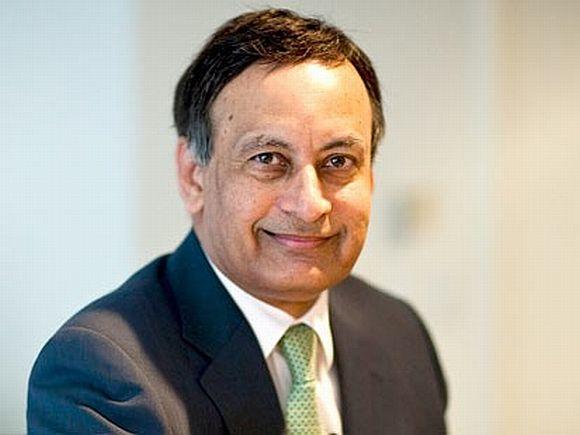
Amir Mir reports from Islamabad that the fall from grace for Pakistan's influential ambassador to Washington Hussain Haqqani on charge of seeking the Americans' help against the mighty military establishment of his own country to ward off a possible coup, is in fact the outcome of a constant civil-military tussle which has been going on since April 2008 when a khaki-turned diplomat Maj Gen (retd) Mahmood Ahmed Durrani was replaced with Haqqani as ambassador to the US.
The crisis-like situation in Islamabad will persist in days and weeks to come, given the fact that the civil-military imbalance in Pakistan remains tilted dangerously.
Tensions between the civilian and the military leadership are simmering for almost six weeks now following the October 10 publication of an article by Mansoor Ijaz in an op-ed piece for Financial Times, claiming that he helped deliver the controversial memo to (former chairman of the US Joint Chiefs of Staff) Admiral Mike Mullen, supposedly dictated to him by Hussain Haqqani, considered to be a close confidant of President Asif Zardari, who had to quit in the end.
The memo was meant to fend off a possible military coup against the government in Islamabad after the US Navy SEAL raid in May that killed Al Qaeda leader Osama bin Laden.
Haqqani announced his resignation on November 22 following a high-level meeting held at the prime minister's residence of the civil-military top brass that included Zardari, Prime Minister Yousaf Raza Gillani, chief of army staff General Ashfaq Pervez Kiani, Inter-Services Intelligence chief Lt Gen Ahmed Shuja Pasha, and Haqqani.
Please ...

"I have requested Prime Minister Gilani to accept my resignation," Haqqani said in a Twitter post shortly after the meeting. However, his implicit claim of submitting a resignation voluntarily was promptly contradicted by the prime minister's office in a statement saying, "Hussain Haqqani was asked to submit his resignation in order to pave the way for a proper investigation at an appropriate level (into the allegations leveled against him)".
The statement, however, did not elaborate which forum would probe the charge against him. "All concerned would be afforded sufficient and fair opportunity to present their views," the statement said.
No timeframe was given regarding the investigations. Despite saying he had submitted his resignation, Haqqani remained adamant that he had nothing to do with the controversial memo that cost him his ambassadorship.
"I have resigned to bring closure to this meaningless controversy threatening our fledgling democracy. I still maintain that I did not conceive, write or distribute the memo," Haqqani said, adding that the resignation was "not about the memo ... this is about bigger things."
Haqqani's close associates claim that he put up a strong fight during the November 22 meeting when quizzed jointly by the civilian and military leadership. But he eventually agreed to quit to pave the way for holding a fair investigation amid rumours that he actually lost his job because of an ongoing power struggle between the military and civilian leadership for control over who manages relations with the United States.
Therefore, many in Pakistan believe the crisis has not ended with the resignation; rather, it is the beginning of the story.
In his article, Ijaz, who has a knack for finding himself at the center of controversies, claimed that in return for US help, Zardari had offered to replace the army and ISI chiefs.
Written on May 10, the alleged memo urges Mullen to convey a "strong, urgent and direct" message to Kayani and Pasha to "end their brinkmanship aimed at bringing down the civilian apparatus".
Former US national security advisor James Jones has said that he delivered the memo to Mullen after receiving it from Ijaz. The memo told Mullen that after the raid in Abbottabad that killed bin Laden, there was a dangerous slide in Islamabad in which no controls appeared to be in place.
The memo warned that the military, unhappy with the covert US raid, could topple the civilian government and if that happened, Pakistan could become a sanctuary for bin Laden's legacy and potentially the platform for a far more rapid spread of Al Qaeda's brand of fanaticism and terror.
The memo told the Americans that an opportunity existed for civilians to gain the upper hand over the army and intelligence directorates due to their complicity in the bin Laden matter.
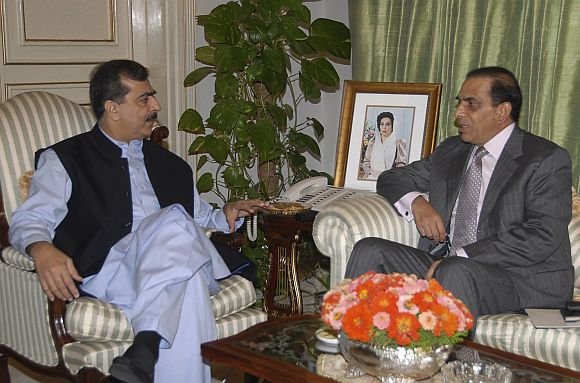
According to Ijaz, the memo was from Zardari and dictated to him (Ijaz) by Haqqani almost a week after the Abbottabad raid.
The Pakistan government had flatly denied knowledge of the memo. Mullen, too, initially denied having dealt with Ijaz, but later acknowledged having seen the memo, although he said he disregarded it as not being credible.
Pentagon spokesman Captain John Kirby, who had previously worked under Mullen, also issued a statement saying Mullen knew the emissary who had brought the memo to him but he did not believe it was from Zardari.
"Admiral Mike Mullen had no recollection of the memo and no relationship with Mansoor Ijaz. After the original article appeared, he felt it incumbent upon himself to check his memory. He reached out to others who he believed might have had knowledge of such a memo and one of them was able to produce a copy of it. But the letter was not signed and he did not find the contents credible at all because nothing in it indicated that it was from President Asif Zardari. Also, neither the contents of the memo nor the proof of its existence altered or affected in any way the manner in which Mr Mullen conducted himself in his relationship with General Kayani and the Pakistan government."
Whatever the truth, the controversy -- dubbed "memogate" -- has exacerbated tensions between the frail civilian government and the ever-powerful generals. The alleged memo offers a six-point plan on how Pakistan's national security leadership could be altered in favour of American interests, with the formation of a new security team top on the list.
As per the memo, the new team, formed with US help, would hold an independent and accountable inquiry into the bin Laden raid and would implement a policy of either handing over to the US or killing Al Qaeda leftovers and militants from the various groups operating from Pakistani soil.
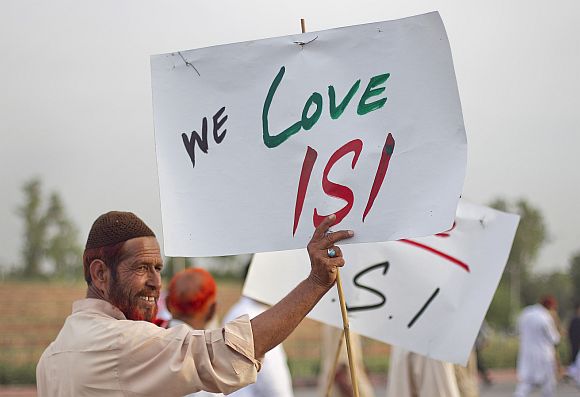
The team would also give the American military the "green light" to conduct operations to capture or kill them on Pakistani soil.
Furthermore, the new security team would develop an acceptable framework of discipline for Pakistan's nuclear program. The team would also eliminate Section "S" of the ISI that is charged with maintaining relations with the Taliban and the Taliban-linked Haqqani network that operates in Afghanistan from Pakistan's border areas.
The memo offers to reshape Pakistan's national security leadership, cleaning those elements within the military and intelligence agencies that have supported religious radicals and the Taliban.
The memo further reminds the US administration: ... that its political/military backing would result in a revamp of the civilian government that, while weak at the top echelon in terms of strategic direction and implementation (even though mandated by domestic political forces), in a wholesale manner replaces the national security adviser and other national security officials with trusted advisers that include ex-military and civilian leaders favourably viewed by Washington, each of whom have long and historical ties to the US military, political and intelligence communities.
Haqqani, an ex-journalist who is clearly not the most liked person in the military establishment for having criticised it in his writings before being appointed ambassador, rejected Ijaz's claims as "a bundle of lies", saying, "I have been consistently vilified as being against the Pakistani military even though I have only opposed its intervention in political affairs."
He added that in Pakistan, a single person's false claims could create a crisis and that the enemies of democracy were behind the scandal as they wanted to use it as an excuse to undo democracy.
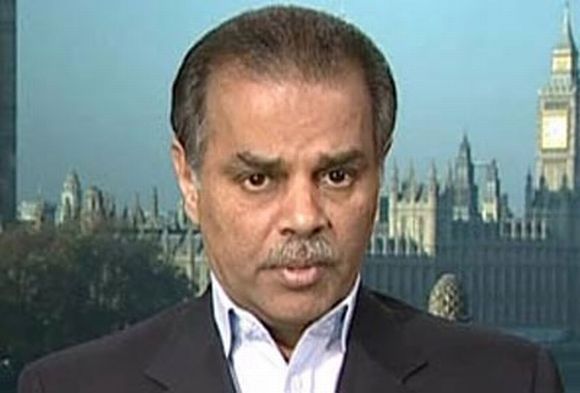
Haqqani's primary defence was that the memo was unsigned and unverified. He said Ijaz had given several interviews to the media that clearly showed that he only wanted to create misunderstanding between the civilian and military establishments, and strain Pakistan-US ties further.
Reminding that Ijaz was the same person who had branded the ISI a terrorist organisation, Haqqani said: "Think about the objectives of Mansoor (Ijaz) before doubting me and my credibility. It is beyond comprehension why a person first delivered a memo and later made it public, and targetted a particular person."
Haqqani said all technical proof was fabricated and he was ready for a probe into the reality through a Supreme Court judge: I was defending the Pakistan army on American television channels after the May 2 Abbottabad raid, unlike Mansoor who had declared the ISI a terrorist organisation. Remember, he is a US citizen; how could he defend the interests of Pakistan? I leave it to the president and the premier to decide how the story of a suspected person could be authentic.
Haqqani's clarifications apart, Ijaz has already retracted his previous claim that there was some understanding between Zardari and Haqqani regarding the memo, saying that the president had no knowledge of any such document.
Speaking in a live talk show on a Pakistani television channel, Express News, on November 20, Ijaz said the president might have spoken to Haqqani after the May 2 raid about the pressure on him, hence asking the latter to help him out in this regard while leaving the mechanics to the ambassador on how to go about it.
Ijaz had earlier claimed in his Financial Times article that he had, on Zardari's instructions and with the help of Haqqani, drafted and delivered the memo to Mullen. Ijaz's backtracking on the alleged involvement of Zardari has created a sense of respite for the government, besides creating doubts about the credibility of the accuser.
A former official of the US Central Intelligence Agency, Bruce Riedel, has dismissed the memo as a clumsy fake that threatens to further destabilie an already deeply divided Pakistan.

From the outset the Pakistani military and intelligence establishment suspected Hussain Haqqani and wanted the government to make him face an inquiry for working against the national interest.
In view of the sensitive nature of the charges, it was decided at the highest level of the military leadership that the initial investigation must be carried out by the top spymaster himself.
Thus, ISI chief Pasha flew to London to meet Ijaz on October 22, less than two weeks after Ijaz disclosed the existence of the memo in the Financial Times column. According to Ijaz, the ISI chief conclusively authenticated the delivery of the memo to Mullen before raising the issue with the president and the prime minister.
The Ijaz-Pasha meeting took place at the Park Lane InterContinental hotel in London. Ijaz, carried a fairly large quantity of records, both copies and originals. These were subsequently put through a verification process following which the ISI chief briefed Kayani, who ultimately took up the matter with Zardari on November 15 in a one-on-one meeting at the presidency.
Kayani impressed on the president the inevitable necessity of Haqqani's presence in the country to explain his alleged role in the controversy -- which is what happened.
In fact, the military establishment had been gunning for Haqqani for a long time, especially after he wrote a controversial book in 2005, titled Pakistan: Between Mosque and Military, in which he exposed the unholy historical nexus between the military and militants and how the military tried to win US support when needed, while at the same time strengthening ties with militants.
After he was appointed ambassador to Washington in April 2008, soon after the Pakistan Peoples Party came into power, Hussain Haqqani became an instant target of those in the establishment who used to despise him.
Being a political appointee and someone considered close to President Asif Zardari, he was first accused of working against the national interest by manipulating the insertion of pro-democracy clauses in the Kerry-Lugar-Berman legislation that committed $7.5 billion to Pakistan over five years as a strategic ally.
The legislation annoyed the establishment because it required the military to be made accountable to elected leaders. The legislation also demanded that Pakistan must crack down on extremist groups, especially the Haqqani network which was considered close to the army.
As the establishment accused Haqqani to have maneouvered the controversial clauses, McClatchy, an American newspaper claimed on November 27, 2009 that a military spy agency has recorded a conversation between President Zardari and Husain Haqqani, discussing the Kerry Lugar Bill. But Haqqani was lucky enough to have survived at that time.
Haqqani courted another controversy after being accused of enabling undercover CIA agents to get Pakistani visas. He was again criticised for pledging an impartial and public investigation into how Al Qaeda chief Osama bin Laden came to be lodged in Abbottabad when the military was insisting there would be no more than a confidential internal inquiry at best.
Yet the memogate scandal finally made him quit after the military leadership told President Zardari that nothing short of Haqqani's head will suffice for his alleged role in the anti-establishment scam.
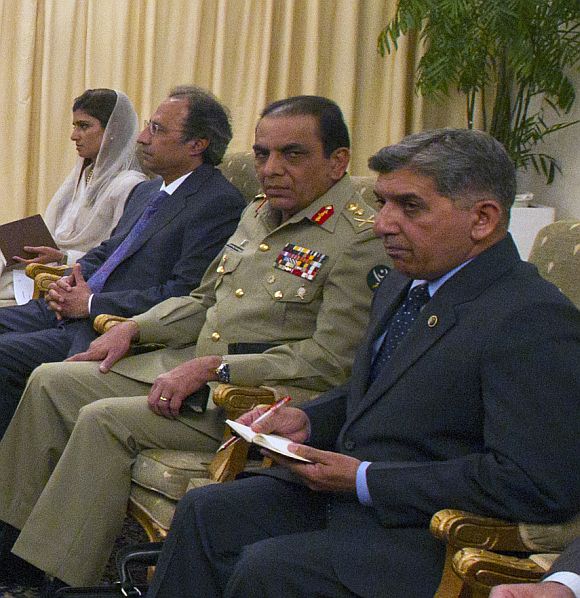
In fact, the dilemma with Pakistan is that its military establishment has ruled the country for more than half the years since independence and therefore, it is quite hard to depoliticise it. Hence, like their predecessors, the incumbent military leaders, despite making repeated pledges to depoliticise their institution, keep asserting themselves in times of crises.
To recall, General Kayani owes his current position to President Zardari who had granted him an unprecedented second three-year term as the army chief in July 2011 -- something that no elected government had done before.
Likewise General Kayani's right-hand man -- ISI chief Pasha -- has already got one-year extensions twice by the Zardari government after the expiry of his tenure on March 18, 2010, despite intense opposition by the Pakistan Muslim League led by Nawaz Sharif.
Speaking at a news conference in Islamabad on May 11 (following the May 2 Abbottabad raid) Nawaz Sharif accused the Pakistani military and the ISI leadership of negligence and incompetence, adding that it was a worst case of negligence and incompetence by the security agencies.
However, it was President Asif Zardari who came forward to defend Kayani and Pasha. In a speech at a gathering of PPP workers on the occasion of the 58th birth anniversary of Benazir Bhutto on June 22, Zardari said, (while addressing Nawaz Sharif) there is no single country in the world which survived after its institutions, including the army, were damaged.
"Do not speak against the institutions. Do not talk about breaking them. Some imprudent politicians want to divide the army officers and jawans. It will have dangerous consequences".
Hitting back at a press conference on June 23, the leader of opposition in the National Assembly Chaudhry Nisar Ali Khan went to the extent of saying: "I congratulate the armed forces of Pakistan on having their new spokesman in the form of President Zardari".
Subsequently, for the first time in 64 years since Pakistan came into being, the country's military and intelligence bosses had to appear before a joint session of the Parliament on May 13 to explain their collective failure.
The military and the intelligence leadership offered itself to the elected parliament for accountability over deficiencies that came to light in the wake of the May 2 raid.
Before May 13, it would have been unimaginable to think that the ISI chief could ever answer scathing questions being posed by parliamentarians.
The khaki leadership has been trying to restore its wounded pride ever since the Abbottabad raid and the Haqqani episode came as a golden opportunity for the establishment to re-enforce its authority over the civilians who had dared to make them answerable before the parliament.